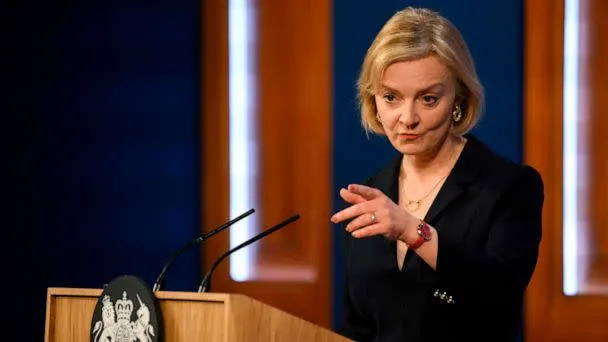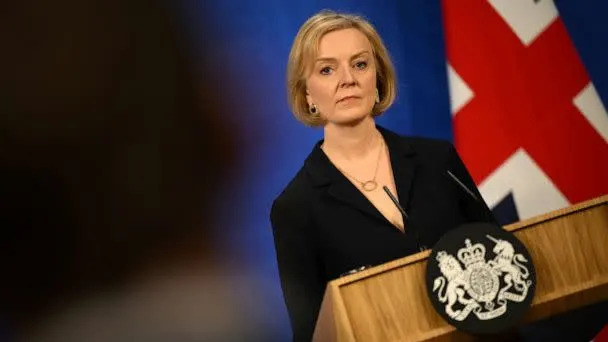ONLY THE TELEGRAPH COULD IDENTIFY A LEFT
Camilla Tominey

Suella Braverman - Carl de Souza/Pool/AFP via Getty Images
To lose one senior member of the Cabinet in a week looks unfortunate. To lose two appears positively careless.
But the departure of Suella Braverman as home secretary speaks to a bigger problem for Liz Truss than sheer optics.
In sacking two key allies on the Right, only for them to be replaced by opponents more to the Left of the party, the Prime Minister is increasingly looking like the victim of a Conservative coup.
It is certainly ironic that the former home secretary, in post for just 43 days, first used that word to describe those who plotted against Ms Truss’s original plan to link benefit to wages rather than inflation.
With that, and most of her mini-Budget up in flames thanks to a rebellion by the moderates, Jeremy Hunt now appears to be the de facto Prime Minister.
He will now be joined by his fellow Sunakite Grant Shapps, who despite being rejected from Ms Truss’s original cabinet, has now been appointed to replace Mrs Braverman at the Home Office.
Regardless of claims that Mrs Braverman sent an official document from her personal email – for which she apologised in her resignation letter – her swift exit from one of the highest posts in public office will anger her European Research Group supporters.
It was only on Tuesday evening that Ms Truss was said to have charmed the backbench group of Eurosceptics with her honest, straight-talking approach.
They are unlikely to take kindly to their former chairman, a darling of the grassroots, being ejected in such unseemly fashion.
Mrs Braverman, a Conservative leadership candidate herself over the summer, received the longest standing ovation at the Tory Party conference two weeks ago.

Penny Mordaunt Liz Truss Therese Coffey - UK Parliament/Jessica Taylor
When taking aim at oil protesters, she told the Commons on Tuesday: “I’m afraid it’s the Labour Party, it’s the Lib Dems, it’s the coalition of chaos, it’s the Guardian-reading, tofu-eating, wokerati – dare I say, the anti-growth coalition – that we have to thank for the disruption we are seeing on our roads today.”
While it might have angered the One Nationers, the comments will have been catnip to the average Tory member and, indeed, whatever voters the Conservatives have left.
If rumours are to be believed that she fell out with Ms Truss over a number of policy issues, after being cut out of migration policy altogether, backbenchers will rightly worry that the Prime Minister may now have gone soft on border control as well as Treasury orthodoxy.
‘The Conservative Party is dead’
Tory grey hairs have already been warning of a party split and a “wet” cabinet takeover only serves to pour oil on troubled waters.
Naturally, Nigel Farage was one of the first to take to Twitter to declare the Conservative Party “dead”:
How new UK Prime Minister Liz Truss lost her authority to govern
It was only six weeks ago that Liz Truss met Queen Elizabeth II and was appointed the new prime minister of the U.K. But six weeks is a long time in British politics and, after a major policy U-turn along with unconvincing attempts to reassure her Conservative party and the public, she is already under major pressure to resign.
Prime Minister Truss, who remained loyal to her predecessor Boris Johnson before his resignation this summer, won the Conservative leadership contest with the promise of a low tax, high growth economy. Her spending plans were criticized by her leadership rival, former finance minister Rishi Sunak, who said “borrowing your way out of inflation is a fairytale” at the time in July.
Kwasi Kwarteng, the new Chancellor of the Exchequer, announced the government's first major policy plan to advance Truss's economic vision in the House of Commons on Sept. 23. Their package included measures to cut the rate of tax for the highest earners, cancel a planned corporation tax increase, remove a cap on bankers’ bonuses, and all this while also promising billions to tackle the looming threat of rising energy bills ahead of the winter, attributed by the government to the war in Ukraine.
The plan was criticized by opposition politicians and economists, and the International Monetary Fund issued a sharp rebuke to their plans, saying in a statement widely interpreted to be scathing that “we do not recommend large and untargeted fiscal packages at this juncture” and the budget would “likely increase inequality.”
Economic chaos followed, as the budget triggered an immediate adverse reaction from the markets. The Bank of England, the U.K.’s central bank, was forced to buy government bonds to ease fears that the state pension fund could collapse. Interest rates were forecast to rise, meaning mortgages rates, as well as household bills, were set to increase against a backdrop of rising inflation.
The budget prompted rare criticism from President Biden, who said “I wasn’t the only one that thought it was a mistake,” and that the outcome was “predictable.”
Amid mounting criticism the government attempted to calm the storm, but last week Kwarteng, a long-time supporter and personal friend of Truss, became the first ministerial casualty of the policy, as he was asked to resign as chancellor.
The new chancellor, Jeremy Hunt, then announced an effective reversal of all the key measures introduced in the September budget -- leading many to speculate that he, and not Truss, had become the de facto leader of government policy. Tuesday’s headline in the Daily Mail, which backed her leadership campaign and supported her budget at the time, read: “In Office, But Not In Power.”
While Truss insisted her plans were right for the country in public, the speed of the collapse in her authority with her Conservative colleagues has generated a great deal of parody. After The Economist magazine quipped that Truss “blew up her own government” so quickly that she had “roughly the shelf-life of a lettuce,” the Daily Star, a tabloid, set up a live stream to monitor if she could outlast a lettuce of their own.
The Conservative Party still command a strong majority in the House of Commons after Boris Johnson’s election win in 2019, and the next public vote is not due until 2024. Truss insisted to the BBC on Monday she will lead her party into the next election, but now the new prime minister faces a daily challenge to stay in office.
How new UK Prime Minister Liz Truss lost her authority to govern originally appeared on abcnews.go.com

Economic Update from the Chancellor of the Exchequer, in London
Mon, October 17, 2022 at 3:03 PM·2 min read
LONDON (Reuters) -Britain's Prime Minister Liz Truss apologised for "mistakes" in her programme that caused investor confidence to evaporate and her poll ratings to plunge before nearly all of it was finally shredded on Monday, but said she would not step down.
"I do want to accept responsibility and say sorry for the mistakes that have been made," Truss told the BBC.
"I wanted to act but to help people with their energy bills to deal with the issue of high taxes, but we went too far and too fast."
Finance Minister Jeremy Hunt, who was appointed on Friday after Truss sacked her close ally Kwasi Kwarteng, jettisoned the remaining major planks of her tax-cutting agenda on Monday, including scaling back her vast energy support scheme.
Asked if she was now prime minister in name only, Truss said she had appointed Hunt because she knew she had to change direction.
"It would have been completely irresponsible for me not to act in the national interest in the way where I have," she said.
"It was right that we changed policy."
Truss and Kwarteng attempted to upend British fiscal policy by unveiling 45 billion pounds of unfunded tax cuts last month to snap the economy out of stagnation.
But the response from bond investors was brutal and borrowing costs surged. Lenders pulled mortgage offers and the Bank of England eventually had to step in to stop pension funds going under.
Asked about the impact of her policies, Truss said she understood it was "very difficult" for families across the country and that she would do what she could to help them.
Her two-year energy package, however, was drastically scaled back by Hunt and will now last only until April.
"The most vulnerable will be protected into next winter," she said. "We're looking at exactly how we can do that."
Truss, who became leader less than six weeks ago, is facing a possible revolt from her lawmakers as soon as this week, according to reports.
But she remained defiant on Monday, saying she would lead her Conservatives into the next election.
"I'm sticking around because I was elected to deliver for this country," she said. "And that is what I am determined to do."
(Reporting by Paul SandleEditing by Chris Reese and Deepa Babington)




























